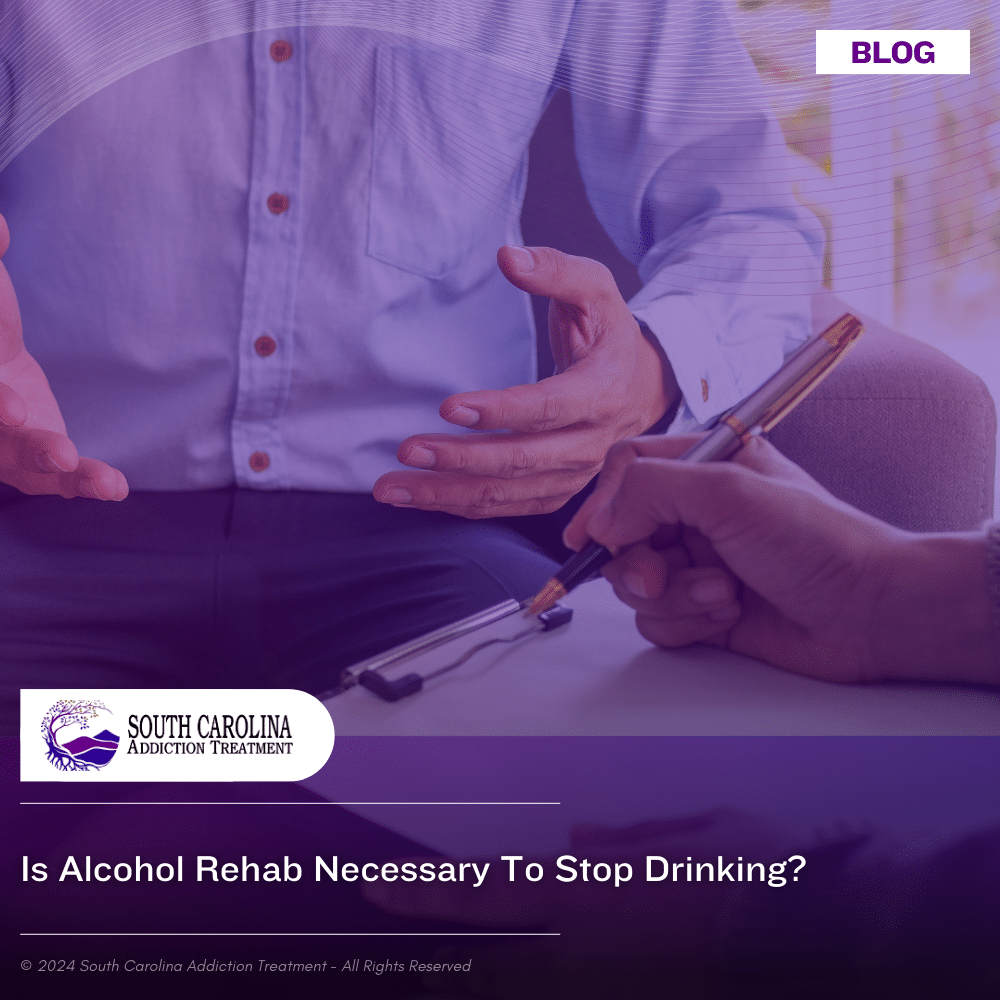Is Alcohol Rehab Necessary to Stop Drinking?

Medically Verified: 2/1/24
Medical Reviewer
Chief Editor

All of the information on this page has been reviewed and verified by a certified addiction professional.
Alcohol is a part of our country’s culture. People in the United States use alcohol to socialize, relax, and celebrate. While many people can enjoy moderate drinking as part of a healthy lifestyle, others may develop a problematic relationship with alcohol or become addicted.
There are many signs that your relationship with alcohol may be unhealthy. If you are worried about your drinking–or your friends and family are concerned–you may want to cut back or stop drinking altogether.
If you have been drinking heavily or for an extended period, you may experience challenges trying to quit drinking. Some people find they have uncomfortable physical side effects. Others may have difficulties managing stress or other discomforts without drinking.
When people stop drinking after a period of alcohol abuse, they may need emotional or medical support. It is also essential to learn new ways of coping with stress, pain, and other challenges without relying on alcohol to numb discomfort. It may be tough for many people to stop drinking without rehab.
Comprehensive alcohol rehab programs provide the structure, support, and treatment people need to overcome alcohol use disorder. For information about starting alcohol rehab or our other programs, reach out to the South Carolina Addiction Treatment staff today.
Do I Need to Quit Drinking?
National surveys have found that 14.5 million people ages 12 and older (5.3 percent of this age group) had an alcohol use disorder.[1] Alcoholism can have long-lasting, devastating consequences on a person’s mental and physical health, relationships, and ability to function in daily life.
The symptoms of alcohol addiction include:
- Feeling out of control over one’s drinking
- Losing interest in hobbies, activities, and relationships that were once important
- Spending a lot of time and energy drinking or recovering from drinking
- Falling behind at work, school, or at home because of drinking
- Facing legal or financial trouble related to drinking
- Continuing to drink despite negative consequences
- Experiencing withdrawal symptoms if they stop drinking
- Wanting to quit drinking but feeling unable to stop
But you do not have to meet the criteria for a diagnosis of addiction to have a problematic relationship with alcohol. Regularly drinking too much or using alcohol to manage your emotions can be signs that you may need help to quit drinking.
- Some signs of problematic drinking include:
- Drinking alone
- Not feeling able to limit your drinking–for example, feeling unable to stop at “just one drink”
- Habitual drinking, or developing a drinking ritual
- Experiencing blackouts when drinking
- Feeling irritated if your plan to drink is interrupted
- Developing tolerance–needing more alcohol to get the desired effect
These symptoms, especially developing tolerance, may be red flags. In time, problematic drinking can turn into an addiction that requires treatment.
Can I Stop Drinking Without Rehab?
In some cases, people can stop drinking when they choose without problems. But in others, people may find that they experience physical or emotional withdrawal symptoms that make it difficult to quit drinking when they choose.
Alcohol depresses the central nervous system (CNS). If someone drinks heavily for a length of time, their body adjusts to the continual presence of alcohol by increasing central nervous system activity. If someone suddenly stops drinking, their CNS keeps functioning in this heightened state.[2] This causes many of the common symptoms of alcohol withdrawal.
Some of the most common alcohol withdrawal symptoms include:
- Sweating
- Increased heart rate
- Tremors
- Insomnia
- Physical agitation
- Auditory and visual hallucinations
- Nausea and vomiting
- Anxiety
Although less common, some people experience dangerous symptoms during alcohol withdrawal, including seizures and elevated blood pressure. It is crucial to have medical supervision during withdrawal to monitor your health, regardless of your risk factors.
Many people also experience intense cravings for alcohol during withdrawal. The discomfort of their withdrawal symptoms and the intensity of their cravings may lead people to relapse before they have the chance to experience a complete detox.
For the best chance at a safe, complete detox, you must participate in an alcohol rehab program.
What Happens in Alcohol Rehab?
Alcohol addiction is a complex condition. Comprehensive alcohol rehab programs need to identify and treat the behavioral, physical, and environmental aspects to be effective.
Many people begin rehab in a medically-supervised detox program. During detox, medical and support staff will monitor and treat you for your withdrawal symptoms. Treatments generally include medications and therapies that can keep you calm and comfortable during the detox process.
After detox, you must participate in a comprehensive treatment program. Alcoholism treatment plans utilize a combination of evidence-based and holistic therapies that can give you the skills you need to adopt a healthy lifestyle and avoid relapse for life. Your treatment plan may include:
- Individual counseling
- Family therapy
- Group counseling
- Education
- Medications
- Mental health and medical treatments
- Holistic treatments like exercise, nutrition counseling, mindfulness practice, and acupuncture
After treatment, you must develop an aftercare plan that will keep you engaged in your recovery and provide the support you need to stay sober for life.
Get Help Now
If you or a loved one needs help to quit drinking, reach out to South Carolina Addiction treatment staff today. We can provide you with the support, comfort, and medical treatment that you deserve.
References:

